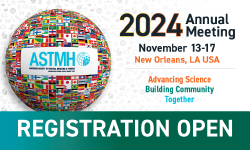| Past two years | Past Year | Past 30 Days | |
|---|---|---|---|
| Abstract Views | 813 | 368 | 49 |
| Full Text Views | 20 | 3 | 0 |
| PDF Downloads | 20 | 5 | 0 |
Physical Activity, Opportunity for Reinfection, and Sibling History of Heart Disease as Risk Factors for Chagas' Cardiopathy
Search for other papers by F. Zicker in
Current site
Google Scholar
PubMed
Search for other papers by P. G. Smith in
Current site
Google Scholar
PubMed
Search for other papers by J. C. Almeida Netto in
Current site
Google Scholar
PubMed
Search for other papers by R. M. Oliveira in
Current site
Google Scholar
PubMed
Search for other papers by E. M. S. Zicker in
Current site
Google Scholar
PubMed
A case-control study was conducted to examine whether physical activity, sibling history of heart disease (HHD), and length of residence in an area endemic for Chagas' disease were associated with the risk of developing Chagas' cardiopathy. Two hundred forty-seven cases of Chagas' heart disease and 345 seropositive subjects with normal ECG (controls) were selected in a population survey in Goiânia, Brazil. Prevalence ratios for exposure variables were estimated for cases in relation to controls and for subgroups of seropositives with selected ECG abnormalities in relation to controls. Increasing age and male sex were consistently and significantly related to an increased risk of ECG abnormalities. HHD was significantly associated with ECG alterations in 3 of the 5 comparison subgroups (any ECG alteration, right bundle branch block, and left anterior hemiblock). No association was found between length of residence in an area endemic, physical activity, and ECG abnormalities. A sample of 529 seronegative subjects were also examined and the interaction between exposure variables and seropositivity was tested to assess whether the associations found were specific for seropositives. Males were at greater risk of any ECG alteration and left anterior hemiblock in relation to females if they were seropositive. An increasing risk of ventricular premature beats with age was clearer for seropositive than for seronegative subjects. Subjects with HHD were at an increased risk of ECG abnormalities and this was greater in those with a positive serological test (P < 0.05). The findings suggest a possible geographical clustering or a familial aggregation of cases of Chagas' heart disease.
Author Notes
| Past two years | Past Year | Past 30 Days | |
|---|---|---|---|
| Abstract Views | 813 | 368 | 49 |
| Full Text Views | 20 | 3 | 0 |
| PDF Downloads | 20 | 5 | 0 |








